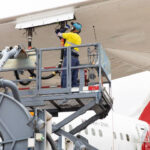Houston-based biogas-to-SAF technology company Syzygy Plasmonics has awarded energy services and project development firm Kent the Front-End Engineering and Design (FEED) contract for what it claims will be the world’s first fully electrified biogas-to-SAF facility. The NovaSAF 1 facility will be located in Durazno, Uruguay, and is expected to produce over 350,000 gallons of ASTM-certified sustainable aviation fuel annually. The project has long-term feedstock and site agreements in place with Estancias del Lago (EDL), one of Uruguay’s largest dairy and agri-energy operations. Powered by Syzygy’s proprietary NovaSAF platform, the company says the facility combines the benefits of biogas and power-to-liquids technologies that leverages waste as feedstock “and eliminates the need for pipelines while achieving ultra-low water use and carbon intensity.” Syzygy claims its SAF will deliver Jet-A cost parity when fully commercialised.
“This is more than just a SAF plant. It’s a new model for biogas economics,” said Trevor Best, CEO of Syzygy Plasmonics, announcing the FEED award to Kent. “We’re unlocking a global asset class of underutilised biogas sites and turning them into high-value clean fuel hubs without pipelines, costly gas separation or subsidy dependence. We believe NovaSAF represents one of the few viable pathways to producing SAF at conventional jet fuel parity and successfully decarbonising air travel.”
Permitting and equipment sourcing is ongoing alongside front-end engineering work led by Kent, reports Syzygy.
The company believes its electrified pathway can potentially qualify as a RFNBO to meet EU regulations. It says the technology utilises both cow manure-derived biomethane and CO2, renewable electricity and steam as feedstocks and provides a greater than 50% SAF yield than conventional thermal biogas reforming pathways, with a targeted 80% reduction in carbon intensity compared to Jet-A.
A final investment decision (FID) is planned for the final quarter of 2025, which could result in commercial operations starting in 2027.
“By combining agricultural waste with Uruguay’s nearly 100% renewable grid, we’re making low-cost and abundant SAF a reality,” said EDL’s COO, Jose Pedro Sanchez.
Photo: Syzygy’s demo plant in Houston, Texas















More News & Features
Catagen launches SAF production company and signs offtakes with Ryanair and Shell
US rebukes ICAO for wasting resources on climate financing initiatives and warns against global levies
Australia announces A$1.1bn incentive scheme to drive local production of low carbon fuels including SAF
Oneworld airline partners join with Breakthrough Energy Ventures to invest in new SAF technologies
New Danish measures emerge to reduce aviation’s air and ground emissions
More targeted and faster measures needed to overcome barriers and unlock SAF’s full potential, finds PA study